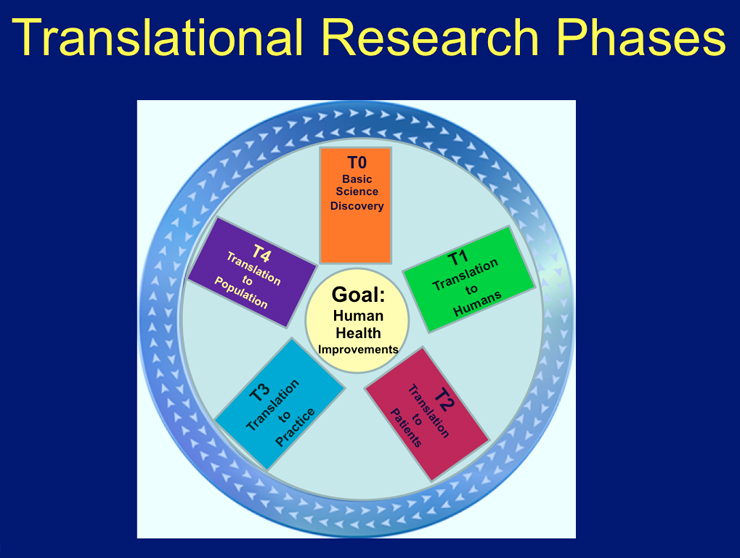Collaborating Institutions
- University of Maryland, Baltimore
- University of Maryland College Park
- University of Maryland Medical System
- Baltimore Veterans Affairs Medical Center
- University of Maryland BioPark
- Geisinger Health System
The University of Maryland Clinical and Translational Sciences Institute - CTSI, is a unique umbrella organization that creates an infrastructure to facilitate the translation of fundamental science to patient care and to the community. Through expanded collaboration across the University of Maryland and the University System of Maryland, the CTSI will transform the research and clinical enterprise at the University of Maryland, and allow us to make a quantum leap in our ability to conduct translational science.
Harvesting the richness of our university centers, institutes, and hospitals the CTSI creates a multidimensional, multidisciplinary research infrastructure that will traverse and integrate clinical and translational science. Under the CTSI, basic science research will develop rapidly into novel therapies that can prevent the occurrence of common chronic diseases prevalent in our region, our country, and around the world.
The institute is led by co-directors Alan R.Shuldiner, MD and Stephen Davis, MBBS. The Dr. Shuldiner is the John L. Whitehurst Professor of Medicine, and Associate Dean for Personalized and Genomic Medicine. Dr. Davis is the Dr. Theodore E. Woodward Professor and Chair in the Department of Medicine. Both are experienced clinical and translational investigators whose combined expertise spans from basic discovery at the level of DNA to clinical research and community engagement. Both have a long track-record of continuous NIH funding and extensive experience in the administration of large multidisciplinary research programs and infrastructure grants, and in the mentoring and training of young investigators. The leadership also includes associate directors Robert S. Gold, PhD, DrPH, FASHA, FAAHB, who is Dean of the School of Public Health of the University of Maryland, and David H. Ledbetter, PhD, FACMG, Executive Vice President and Chief Scientific Officer, Geisinger Health System.
Under the CTSI, our basic science and clinical researchers will focus on chronic preventable diseases and diseases with high morbidity, high mortality, and high disability - areas where we can make an impact and transform lives for the better. These signature research areas include cancer, heart disease, infectious and inflammatory diseases, diabetes, schizophrenia, and head injury. These illnesses have disproportionately higher morbidity and mortality in urban and rural underserved populations, and affect people across the entire lifespan.
Our CTSI partners will come together in an unprecedented and transformative way. Participating institutions include the professional schools of the University of Maryland, the University System of Maryland, the University of Maryland Medical System, the Baltimore VA Medical Center, the University of Maryland Medical System, and Geisinger Health Systems. We will also partner with key institutions to strengthen our existing capabilities.
The CTSI will align with the newly emerging NIH NCATS and CTSA network, which embraces a reengineering of the clinical research enterprise. The institute will promote team science among investigators by providing an infrastructure to serve and support multidisciplinary research teams across the full spectrum of clinical and translational research. Such an infrastructure brings about efficiency and economies of scale, enhances the quality of research execution, and makes monitoring and compliance more effective.
In addition to conducting translational research, the institute will help advance interdisciplinary education of students in medicine, dentistry, nursing, pharmacy, social work, law, public health, biomedical engineering, and graduate studies. The CTSI will provide improved forums for setting priorities and enhancing communications with state and local agencies, community organizations and healthcare practitioners outside academia to help further provide evidence based interventions designed to reduce healthcare disparities.

